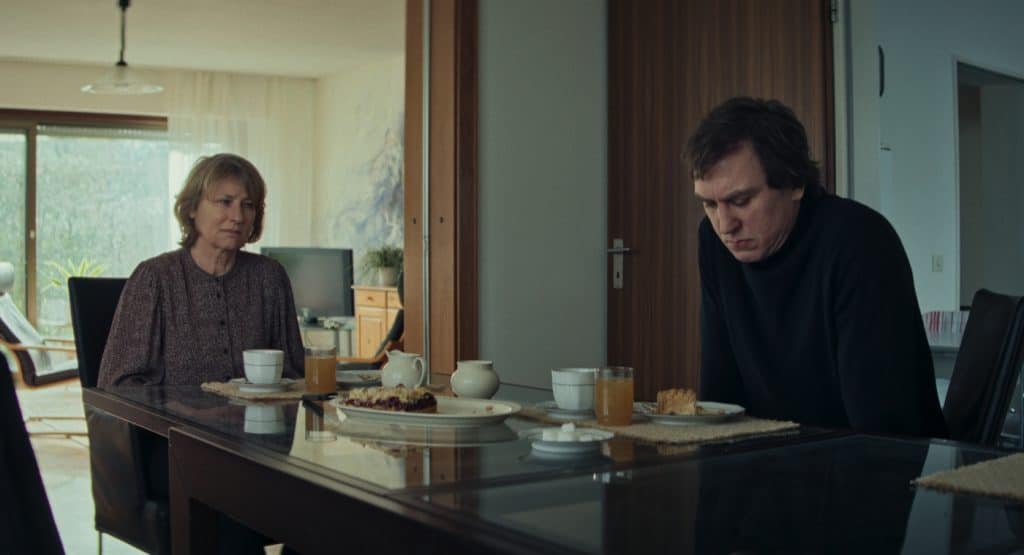An overwhelming cinematic panopticon in which a conductor has to deal with the fact that his parents are dying, his sister is drowning in excess while he rehearses the piece „Dying“ with an orchestra.
FAST FACTS:
• Matthias Glasner’s first feature film in twelve years
• Silver Bear for best screenplay at 74th Berlinale
• 9 nominations for the German Film Award, including Best Picture and Best Director
• Exquisite performances by Corinna Harfouch, Lars Eidinger and Lilith Stangenberg
CREDITS:
Country/Year: Germany 2024; Running Time: 180 minutes; Director & Screenplay: Matthias Glasner; Cast: Lars Eidinger, Corinna Harfouch, Lilith Stangenberg, Ronald Zehrfeld, Robert Gwisdek, Hans-Uwe Bauer; Distributed by: Wild Bunch; Release: April 25, 2024
REVIEW:
Take that, deal with it. What can you expect from a movie that throws „Dying“ at you as its title? As is to be expected from a iconoclast like Matthias Glasner, his first cinematic work since „Gnade“ twelve years ago is once again filmmaking without a net or a false bottom, a cinematic monolith against all rules, which you may rub up against and bump into, but you can’t get past this three-hour piece of cinema, which is on fire from the first to the last moment. It takes its title head-on and tells unvarnishedly of, well, dying, but is always a celebration of life: Every moment, says the screenwriter, director and producer, must be savored, experienced intensely. It’s a lament as well as a song of praise: Drink and be merry, for tomorrow we may die. Amebix sang that many years ago. They have nothing to do with the movie. But it still fits.

„Dying“ is relentlessly autobiographical. Matthias Glasner spreads out a map of his life before the viewer’s eyes, three hours long, divided into five chapters, each of which is a new vignette of his very personal experiences. A movie that wants to tell everything, now and immediately. The starting point was a year in Glasner’s life, when his parents died a few months apart and his first daughter was born in the middle of it – it is she who is seen in the first scene of the film, in which we see a young girl speaking directly to the camera. In his screenplay, he explores the emotions and thoughts that these drastic experiences triggered in him. When you watch the film, you can literally feel how the director forges ahead, sometimes gaining self-confidence, then pausing and contemplating again, then taking new paths to do justice to the complexity of the experience, making sense of it himself, feeling his way to the essence.
At the center is Lars Eidinger as Glasner’s alter ego, Tom Lunies, a conductor in Berlin who is rehearsing the piece „Dying“ with a young orchestra, the latest work by his best friend, the depressive composer Bernard. He is torn between an emotional tour de force, between birth, love, family, life and death: his mother Lissy tells him that his father is dying and that she herself is terminally ill. Tom’s former lover Liv is about to give birth to her child, which is not Tom’s but makes him feel like a father. And finally, Tom’s younger sister Ellen appears on the scene half way through, a relentless drunk who is having an affair with her boss, the dentist Sebastian in Hamburg, and is pushing against the rules of society, preferring instead to choose excess, however short and unhealthy the high may be.
In one scene, the same statement is unmistakably repeated twice. When one of the young musicians asks the conductor and the composer of „Dying“ what the point of playing such a hopeless piece is, they both reply: „The hope lies within the fact that we will rehearse and perform it together.“ This is also the credo of the film, perhaps even the credo of cinema as such: no matter how bleak it gets, no matter how hopeless the situations you tell are, the hope is that you make the movie together. That is the guiding star. You follow it through this open experimental set-up, which is as unsparing as you would expect from the director of „Free Will“ or „This Is Love“, but also has a tenderness, a great love for its characters and the things that make up their lives, a new won maturity that is new to Glasner’s filmmaking. Ellen sings a song by failed British bard Bill Fay in a pub, Tom watches Bergman’s „Fanny & Alexander“ at Christmas. „Dying“ is a holistic experience, which savors existence itself. And doesn’t pull back when the going gets tough, but always manages to be furiously funny in the most bitter moments.
One grandiose scene follows another: the orchestra rehearsal, the argument filmed in one take, in which mother and son sit opposite each other pouring wine, the drunken pas de deux when Ellen pulls Sebastian’s tooth with pliers in a back room, the performance of the play in which Ellen throws up from the balcony, the decisive, very quiet and tragic final moment between Tom and Bernard. The actors perform at the height of their abilities, giving their all and beyond, lavishly, as if they were sinking their teeth into these brilliant roles written for them by Matthias Glasner. Corinna Harfouch as mother Lissy, Lilith Stangenberg as Ellen, Ronald Zehrfeld as Sebastian, Robert Gwisdek as Bernard, Hans-Uwe Bauer as „my father“, as it says on the movie’s poster. And and and. And of course Lars Eidinger, who you often see but have never experienced like he does here, who outgrows himself, who combines all the worries and joys of a life, who is as ruthlessly honest as the whole film, which was awarded the Silver Bear for Best Screenplay at the Berlinale. Well deserved. And yet not enough. If one is honest.
Thomas Schultze
